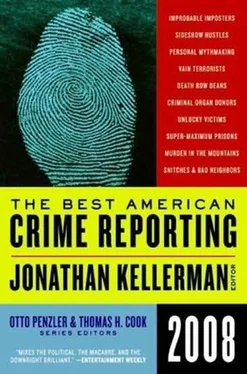Ramos, who is 38, and Compean, who is 7 years his junior, had followed nearly identical paths into the Border Patrol. Growing up in working-class neighborhoods on the east side of El Paso, they had each been the first in their families to graduate from high school. Both had dabbled in college and then joined the military. Both had eloped with their longtime girlfriends and had three children. Ramos coached Little League; Compean, T-ball. But for all that they had in common, they could not have been less alike. Ramos, who was tall and well built, was a seasoned agent who liked to do things his way, shrugging off paperwork and butting heads with his supervisors over Border Patrol policies that he felt reined him in. Compean, who was five feet four and heavyset, was quiet and reserved. Working the line-which required him and Ramos to keep a high profile on the river to “push back” would-be immigrants-could be tedious, but catching dope smugglers was exhilarating and earned them bragging rights around the station. (Compean’s wife, Patty, had filled a photo album with Polaroids of him posing beside narcotics loads that he had helped intercept.) According to one colleague, Ramos and Compean focused on finding narcotics to the exclusion of illegals and called themselves “the drug shift.”
One such shift fell on February 17, 2005, and for Compean, it had started off slowly. Local smugglers usually moved dope the same way: Backpackers would carry sacks of marijuana across the river-in Fabens, the water is shallow enough to walk across-and load them into empty vehicles that traffickers had left on the U.S. side. Drug mules would then cross over from Mexico and drive the loads to nearby stash houses. Though marijuana was smuggled through the area nearly every day, that morning had passed without any unusual activity. According to trial transcripts and Department of Homeland Security investigative reports, a break in the monotony came early that afternoon: Sensors were tripped at a location known for drug trafficking that the Border Patrol called Area 76. Squinting into his binoculars from his post on the Rio Grande, Compean observed a van speeding away. “Did you guys copy?” he called over the radio. “There is a blue van leaving at 76, going pretty quick.”
A rookie agent named Oscar Juarez was patrolling the levee by the river when he heard Compean’s radio transmission. Though he was busy pushing back a large group that had gathered on the opposite side of the river, he was eager to get a drug bust under his belt, and he drove off to look for the van. He caught up with the Ford Econoline just as it reached town and fell in behind it, switching on his overhead lights. But instead of pulling over, the van suddenly turned around and headed south. Ramos, who had interrupted his lunch at the station to join the pursuit, took the lead. “It’s close,” Juarez radioed as they moved in, speeding down farm roads to the river. “We’ve got this baby.”
As they approached the Rio Grande, the pavement yielded to dirt, dead-ending at a drainage canal that agents affectionately call Shit Ditch. The driver, Osvaldo Aldrete-Davila, jumped out of his van as Ramos and Juarez closed in on him. Compean, who had followed the progress of the chase over the radio, was waiting on the south side of the ditch, blocking Aldrete-Davila’s path back to Mexico. As Aldrete-Davila dashed through the sewage water away from his pursuers, Compean pointed his shotgun at the tall, gangly 24-year-old and ordered him to stop. (According to Aldrete-Davila, the agent said, “ ¡Párate, mexicano de mierda! ” or “Stop, you Mexican shit!”) He raised his hands, which were empty.
Then Aldrete-Davila and Compean both heard another agent yell, “Hit him!” (Ramos and Juarez, the only other people at the scene, would later deny having said this.)
“Take it easy, man,” Aldrete-Davila implored, hands still in the air. “Take it easy. No me pegues. ” (“Don’t hit me.”)
Compean would later testify that he had tried to use the butt of his shotgun to push Aldrete-Davila back. (“He put his hands up, but to me, it looked like he was coming at me,” Compean said on the stand.) Whatever his intentions, he swung the butt of his shotgun at Aldrete-Davila, who dodged it. The agent lost his footing and fell face-first into the ditch, dropping his weapon.
Seeing his opening, Aldrete-Davila bolted toward the river, a little more than a hundred yards away. (Compean later claimed to have climbed out of the ditch and tackled him before he broke free again, although no other witness corroborated that account.) As Aldrete-Davila sprinted across the last stretch of American soil, Compean, who had never fired his gun in the line of duty, pulled out his.40-caliber pistol and started shooting. When he missed, he reloaded and tried again, firing a total of fourteen times. Aldrete-Davila kept running, and as he approached the river’s edge, Ramos-who had crossed the ditch to come to his colleague’s aid-fired his first and only shot. The force of the bullet, which entered Aldrete-Davila’s left buttock, knocked him to the ground.
Aldrete-Davila lay on the riverbank, bleeding. He waited for a moment, thinking the two agents were going to arrest him. When he realized that they were not coming, he stood up and limped through the ankle-deep water back to Mexico. Ramos and Compean holstered their weapons and walked away.
Border Patrol agents had begun arriving, gathering near the abandoned Econoline. They included field operations supervisor Jonathan Richards, the most senior agent at the scene, who had grown concerned about the lack of radio communication and had left the station to check on the pursuit. Ramos eventually joined the group, breathing hard, and got ribbed by the other agents for being out of shape. They would later remember that he had seemed agitated. “Hey, Nacho, settle down,” joked Richards. “You’re acting like this is your first load.”
“It’s been a long time,” Ramos said. “I’m fine. It’s just the adrenaline.”
Ramos knew the protocol: A Border Patrol agent who fires his weapon is required to inform a supervisor within an hour. (Border Patrol agents are trained to shoot to kill, not to maim.) Yet as he talked to Richards, he never mentioned that he and Compean had just shot at a suspect fifteen times. Ramos said only that Compean had fallen while he was trying to apprehend the van’s driver and had gotten dirt thrown in his eyes. Richards called out to Compean, who was standing at a distance on the levee, and asked if he was all right. The agent assured him that he was, except for a few cuts on his hand and face, and said nothing about the shooting. Before leaving the area, Compean stooped down to pick up nine of his spent shell casings and tossed them in the ditch.
On his way to the station to write his report, Compean stopped to talk to Arturo Vasquez, a more junior agent, who asked what had happened. “That little bitch took me to the ground and threw dirt on my face,” Vasquez recalled Compean saying. Providing no further explanation, Compean added: “I had to fire some rounds.” He asked Vasquez, who was headed back to the levee, to look for the five remaining spent shell casings-which Compean had been unable to find-since he needed to return to the station. Vasquez knew that the scene of a shooting was supposed to be left undisturbed for the Sector Evidence Team, but in deference to his superior, he agreed.
Back at the station Compean washed up and ran into Richards as he was coming out of the restroom. He had a cut on his hand that had drawn blood. Richards asked him if he had been assaulted by the driver, and Compean denied that he had. “No, I’m okay. Nothing happened,” the agent said. “I just hurt my hand when I fell down, that’s all.”
Читать дальше












